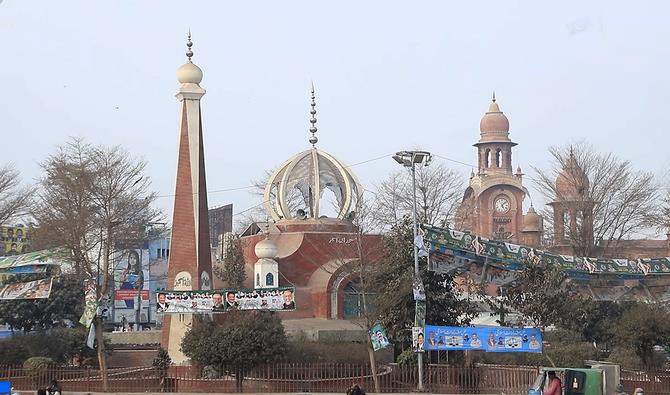
Past election results show party that wins South Punjab often forms government both at center and in Punjab
For decades, region has featured electoral battles between clans such as Qureshis, Gilanis, Legharis, Khosas, Khars
MULTAN: The outcome of this week’s general election will be shaped by political battles in the southern regions of Punjab, Pakistan’s most populous province and its political heartland, analysts said, with the winner in the area playing a pivotal role in the formation of the government at the center and the province.
South Punjab comprises three divisions — Multan, Dera Ghazi Khan and Bahawalpur — and has 13 districts. For decades, this region in Punjab has featured fierce electoral battles between landed families such as the Qureshis, Gilanis, Khosas, Nawanis, Dogars, Legharis, Khars and Jakhars.
Historically, the 46 national and 93 provincial assembly seats in South Punjab represent more than 32 percent of Punjab’s population and are crucial in making or breaking governments. On Feb. 8, 21.89 million registered voters in South Punjab are expected to decide who wins this crucial region and could in turn rule the country.
“South Punjab’s role has always been important in the formation of governments at the center and Punjab, and much of the politics here revolves around electables,” Shakeel Anjum, a Multan-based journalist and analyst, told Arab News, referring to politicians with personal clout in their communities and a sizable vote bank.
Traditionally, he added, ahead of elections most influential politicians in South Punjab joined the party expected to come into power. For example, in 2018, many electables joined the Pakistan Tehreek-e-Insaf party of Imran Khan, which went on to form the government at the center.
“In the Feb. 8 elections (this year), it seems the PML-N is the king’s party and the environment is being made conducive for it (to win the polls),” Anjum said.
Winning big in South Punjab will put the PML-N in a very strong position, analysts and politicians said, as past election results show the party that wins this region often forms the government both at the center and in the province.
In 2018, Khan’s Pakistan Tehreek-e-Insaf (PTI) won 26 National Assembly seats in South Punjab, forming the central and provincial governments, while its rival, the Pakistan Muslim League-Nawaz (PML-N) party, won 11 seats compared to 34 in the 2013 elections. The Pakistan People’s Party (PPP) won 23 seats in South Punjab in 2008 and formed the government at the center, but could win only four seats from here in the 2018 national polls, when it was effectively wiped out as a national-level party and relegated to its traditional strongholds in Sindh province.
PML-N’s Punjab General Secretary Sardar Awais Ahmad Khan Leghari said that he was optimistic about his party’s prospects in South Punjab this election cycle as well.
“People know the PML-N is the only party that delivers on its promises related to development projects,” he said. “Therefore, we are expecting a win in South Punjab.”
The PPP also aims to win back its lost glory.
The party’s Bahawalpur Division president, Javaid Akbar Dhillon, estimated that the PPP would win more than 15 National Assembly and 30 provincial assembly seats from South Punjab.
“Our position is very strong in Multan, Muzaffargarh and Rahim Yar Khan while we will also win seats from Layyah and Kot Addu,” he told Arab News.
“Some electable and political heavyweights of South Punjab are contesting for national and provincial assembly seats on the PPP ticket and we hope they will win their respective constituencies.”
But like elsewhere in Punjab, the real competition will be between the PML-N and candidates backed by ex-PM Khan’s PTI.
Moeen Riaz Qureshi, PTI president in the area, said that the party was leading the election race in all three divisions of South Punjab.
“PTI has fielded candidates on all national and provincial seats in South Punjab and people are responding positively to our campaign,” he told Arab News. “We are hopeful to get a lead in South Punjab like we did in the last elections.”
Dr. Shahzad Ali, director of media studies at the Bahauddin Zakariya University Multan, said that the PML-N was trying to create the perception that its victory was a foregone conclusion but in reality it would still face tough competition from the rival PTI party in South Punjab.
“So maybe in some of the constituencies, located in the countryside of South Punjab, the PML-N will be able to win certain seats,” he said. “But in urban areas, there is going to be a tough competition despite one of the political parties, that is the PTI, being sidelined.”
Anjum, the analyst, said many independent candidates from South Punjab would also be important in the ultimate game of numbers.
“It seems as if whatever government comes up, the independents will have an important role in it,” he said, “and they will play a decisive role in forming the government.”












